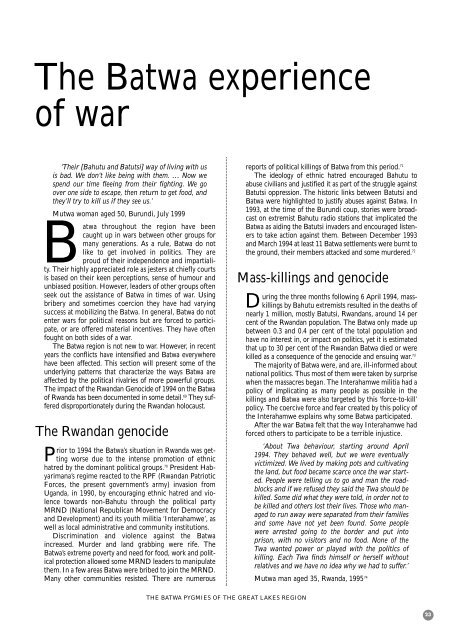The Batwa Pygmies of the Great Lakes Region - UNHCR
The Batwa Pygmies of the Great Lakes Region - UNHCR
The Batwa Pygmies of the Great Lakes Region - UNHCR
Create successful ePaper yourself
Turn your PDF publications into a flip-book with our unique Google optimized e-Paper software.
<strong>The</strong> <strong>Batwa</strong> experience<br />
<strong>of</strong> war<br />
‘<strong>The</strong>ir [Bahutu and Batutsi] way <strong>of</strong> living with us<br />
is bad. We don’t like being with <strong>the</strong>m. … Now we<br />
spend our time fleeing from <strong>the</strong>ir fighting. We go<br />
over one side to escape, <strong>the</strong>n return to get food, and<br />
<strong>the</strong>y’ll try to kill us if <strong>the</strong>y see us.’<br />
Mutwa woman aged 50, Burundi, July 1999<br />
<strong>Batwa</strong> throughout <strong>the</strong> region have been<br />
caught up in wars between o<strong>the</strong>r groups for<br />
many generations. As a rule, <strong>Batwa</strong> do not<br />
like to get involved in politics. <strong>The</strong>y are<br />
proud <strong>of</strong> <strong>the</strong>ir independence and impartiality.<br />
<strong>The</strong>ir highly appreciated role as jesters at chiefly courts<br />
is based on <strong>the</strong>ir keen perceptions, sense <strong>of</strong> humour and<br />
unbiased position. However, leaders <strong>of</strong> o<strong>the</strong>r groups <strong>of</strong>ten<br />
seek out <strong>the</strong> assistance <strong>of</strong> <strong>Batwa</strong> in times <strong>of</strong> war. Using<br />
bribery and sometimes coercion <strong>the</strong>y have had varying<br />
success at mobilizing <strong>the</strong> <strong>Batwa</strong>. In general, <strong>Batwa</strong> do not<br />
enter wars for political reasons but are forced to participate,<br />
or are <strong>of</strong>fered material incentives. <strong>The</strong>y have <strong>of</strong>ten<br />
fought on both sides <strong>of</strong> a war.<br />
<strong>The</strong> <strong>Batwa</strong> region is not new to war. However, in recent<br />
years <strong>the</strong> conflicts have intensified and <strong>Batwa</strong> everywhere<br />
have been affected. This section will present some <strong>of</strong> <strong>the</strong><br />
underlying patterns that characterize <strong>the</strong> ways <strong>Batwa</strong> are<br />
affected by <strong>the</strong> political rivalries <strong>of</strong> more powerful groups.<br />
<strong>The</strong> impact <strong>of</strong> <strong>the</strong> Rwandan Genocide <strong>of</strong> 1994 on <strong>the</strong> <strong>Batwa</strong><br />
<strong>of</strong> Rwanda has been documented in some detail. 69 <strong>The</strong>y suffered<br />
disproportionately during <strong>the</strong> Rwandan holocaust.<br />
<strong>The</strong> Rwandan genocide<br />
Prior to 1994 <strong>the</strong> <strong>Batwa</strong>’s situation in Rwanda was getting<br />
worse due to <strong>the</strong> intense promotion <strong>of</strong> ethnic<br />
hatred by <strong>the</strong> dominant political groups. 70 President Habyarimana’s<br />
regime reacted to <strong>the</strong> RPF (Rwandan Patriotic<br />
Forces, <strong>the</strong> present government’s army) invasion from<br />
Uganda, in 1990, by encouraging ethnic hatred and violence<br />
towards non-Bahutu through <strong>the</strong> political party<br />
MRND (National Republican Movement for Democracy<br />
and Development) and its youth militia ‘Interahamwe’, as<br />
well as local administrative and community institutions.<br />
Discrimination and violence against <strong>the</strong> <strong>Batwa</strong><br />
increased. Murder and land grabbing were rife. <strong>The</strong><br />
<strong>Batwa</strong>’s extreme poverty and need for food, work and political<br />
protection allowed some MRND leaders to manipulate<br />
<strong>the</strong>m. In a few areas <strong>Batwa</strong> were bribed to join <strong>the</strong> MRND.<br />
Many o<strong>the</strong>r communities resisted. <strong>The</strong>re are numerous<br />
THE BATWA PYGMIES OF THE GREAT LAKES REGION<br />
reports <strong>of</strong> political killings <strong>of</strong> <strong>Batwa</strong> from this period. 71<br />
<strong>The</strong> ideology <strong>of</strong> ethnic hatred encouraged Bahutu to<br />
abuse civilians and justified it as part <strong>of</strong> <strong>the</strong> struggle against<br />
Batutsi oppression. <strong>The</strong> historic links between Batutsi and<br />
<strong>Batwa</strong> were highlighted to justify abuses against <strong>Batwa</strong>. In<br />
1993, at <strong>the</strong> time <strong>of</strong> <strong>the</strong> Burundi coup, stories were broadcast<br />
on extremist Bahutu radio stations that implicated <strong>the</strong><br />
<strong>Batwa</strong> as aiding <strong>the</strong> Batutsi invaders and encouraged listeners<br />
to take action against <strong>the</strong>m. Between December 1993<br />
and March 1994 at least 11 <strong>Batwa</strong> settlements were burnt to<br />
<strong>the</strong> ground, <strong>the</strong>ir members attacked and some murdered. 72<br />
Mass-killings and genocide<br />
During <strong>the</strong> three months following 6 April 1994, masskillings<br />
by Bahutu extremists resulted in <strong>the</strong> deaths <strong>of</strong><br />
nearly 1 million, mostly Batutsi, Rwandans, around 14 per<br />
cent <strong>of</strong> <strong>the</strong> Rwandan population. <strong>The</strong> <strong>Batwa</strong> only made up<br />
between 0.3 and 0.4 per cent <strong>of</strong> <strong>the</strong> total population and<br />
have no interest in, or impact on politics, yet it is estimated<br />
that up to 30 per cent <strong>of</strong> <strong>the</strong> Rwandan <strong>Batwa</strong> died or were<br />
killed as a consequence <strong>of</strong> <strong>the</strong> genocide and ensuing war. 73<br />
<strong>The</strong> majority <strong>of</strong> <strong>Batwa</strong> were, and are, ill-informed about<br />
national politics. Thus most <strong>of</strong> <strong>the</strong>m were taken by surprise<br />
when <strong>the</strong> massacres began. <strong>The</strong> Interahamwe militia had a<br />
policy <strong>of</strong> implicating as many people as possible in <strong>the</strong><br />
killings and <strong>Batwa</strong> were also targeted by this ‘force-to-kill’<br />
policy. <strong>The</strong> coercive force and fear created by this policy <strong>of</strong><br />
<strong>the</strong> Interahamwe explains why some <strong>Batwa</strong> participated.<br />
After <strong>the</strong> war <strong>Batwa</strong> felt that <strong>the</strong> way Interahamwe had<br />
forced o<strong>the</strong>rs to participate to be a terrible injustice.<br />
‘About Twa behaviour, starting around April<br />
1994. <strong>The</strong>y behaved well, but we were eventually<br />
victimized. We lived by making pots and cultivating<br />
<strong>the</strong> land, but food became scarce once <strong>the</strong> war started.<br />
People were telling us to go and man <strong>the</strong> roadblocks<br />
and if we refused <strong>the</strong>y said <strong>the</strong> Twa should be<br />
killed. Some did what <strong>the</strong>y were told, in order not to<br />
be killed and o<strong>the</strong>rs lost <strong>the</strong>ir lives. Those who managed<br />
to run away were separated from <strong>the</strong>ir families<br />
and some have not yet been found. Some people<br />
were arrested going to <strong>the</strong> border and put into<br />
prison, with no visitors and no food. None <strong>of</strong> <strong>the</strong><br />
Twa wanted power or played with <strong>the</strong> politics <strong>of</strong><br />
killing. Each Twa finds himself or herself without<br />
relatives and we have no idea why we had to suffer.’<br />
Mutwa man aged 35, Rwanda, 199574 23

















